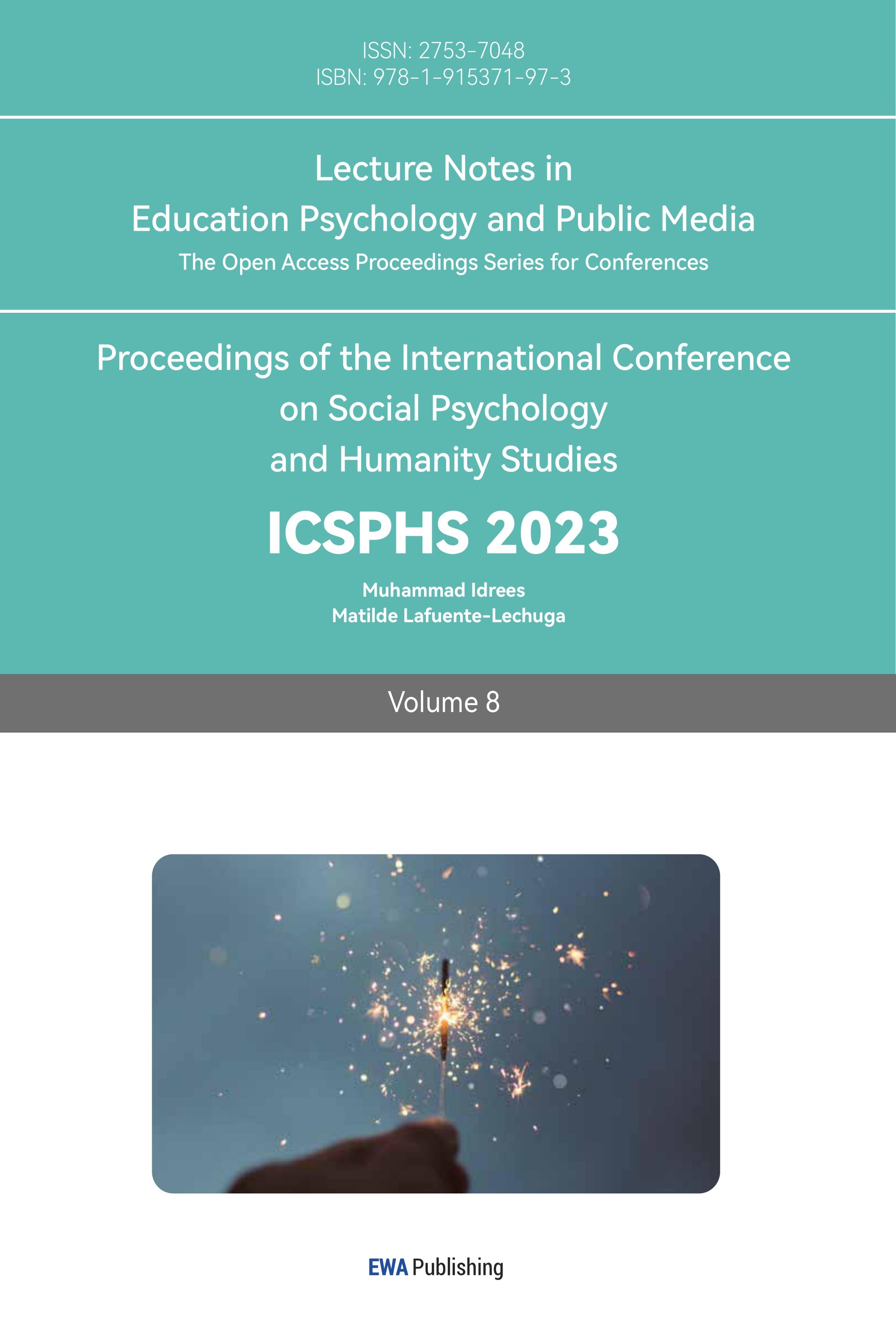References
[1]. Gocmen Baykara Zehra, Keles Sukru. Demir Karabulut Seyhan, Gul Senay, Eren Handan, Durmus Iskender Mahinur, Yildiz Abdullah, Kavas Mustafa Volkam, Yalim Neyyire Yasemin. The effect of professional education on medical and nursing students ‘attitudes toward death.[J]. Death studies,2020.
[2]. Shumei Zhang. Implementation of "Life and Death Education" in Primary and Secondary Schools.[J]. Hospice studies,1988, (14), pp. 46.
[3]. Weixun Fu. The dignity of death and life.[M]. Beijing: Peking University Press, 2006.6, pp. 11-13.
[4]. Shumei Zhang. Research, Discourse and Practice on "Education for Life."[M]. Kaohsiung: Kaohsiung Fuwen Books Co., LTD, 2005, pp.3-34.
[5]. Hannah Friesen,Jennifer Harrison,Melissa Peters,Donna Epp,Nancy McPherson. Death education for children and young people in public schools.[J].International Journal of Palliative Nursing,2020,26(7).
[6]. Feng Yuan, Siguang Chen. An Overview of the Development of Death Education in the USA.[J]. Journal of Hubei Institute of Education, 2007.
[7]. Yuhua Zou. Death Education.[M]. Guangzhou: Guangdong Publishing Group, 2008.
[8]. Yian Hu. Introduction to Modern Life and Death.[M]. Guangzhou: Guangdong Higher Education Publishing House, 2009.1, pp. 29-32.
[9]. Zhenchao Pang, Baoyin Cao. The Unbearable Weightless of Being.[N]. China Education News, 2002-2-1 (5).
[10]. Zengqiang Wu, Guoxi Gao. Study on Life Education for Primary and Secondary School Students in Shanghai.[M]. Beijing: Beijing Normal University Publishing Group, 2006, pp.66-67.
Cite this article
Liu,Y. (2023). The Lack of Contemporary Death Education in China and Its Impact on Public Awareness. Lecture Notes in Education Psychology and Public Media,8,104-108.
Data availability
The datasets used and/or analyzed during the current study will be available from the authors upon reasonable request.
Disclaimer/Publisher's Note
The statements, opinions and data contained in all publications are solely those of the individual author(s) and contributor(s) and not of EWA Publishing and/or the editor(s). EWA Publishing and/or the editor(s) disclaim responsibility for any injury to people or property resulting from any ideas, methods, instructions or products referred to in the content.
About volume
Volume title: Proceedings of the International Conference on Social Psychology and Humanity Studies
© 2024 by the author(s). Licensee EWA Publishing, Oxford, UK. This article is an open access article distributed under the terms and
conditions of the Creative Commons Attribution (CC BY) license. Authors who
publish this series agree to the following terms:
1. Authors retain copyright and grant the series right of first publication with the work simultaneously licensed under a Creative Commons
Attribution License that allows others to share the work with an acknowledgment of the work's authorship and initial publication in this
series.
2. Authors are able to enter into separate, additional contractual arrangements for the non-exclusive distribution of the series's published
version of the work (e.g., post it to an institutional repository or publish it in a book), with an acknowledgment of its initial
publication in this series.
3. Authors are permitted and encouraged to post their work online (e.g., in institutional repositories or on their website) prior to and
during the submission process, as it can lead to productive exchanges, as well as earlier and greater citation of published work (See
Open access policy for details).
References
[1]. Gocmen Baykara Zehra, Keles Sukru. Demir Karabulut Seyhan, Gul Senay, Eren Handan, Durmus Iskender Mahinur, Yildiz Abdullah, Kavas Mustafa Volkam, Yalim Neyyire Yasemin. The effect of professional education on medical and nursing students ‘attitudes toward death.[J]. Death studies,2020.
[2]. Shumei Zhang. Implementation of "Life and Death Education" in Primary and Secondary Schools.[J]. Hospice studies,1988, (14), pp. 46.
[3]. Weixun Fu. The dignity of death and life.[M]. Beijing: Peking University Press, 2006.6, pp. 11-13.
[4]. Shumei Zhang. Research, Discourse and Practice on "Education for Life."[M]. Kaohsiung: Kaohsiung Fuwen Books Co., LTD, 2005, pp.3-34.
[5]. Hannah Friesen,Jennifer Harrison,Melissa Peters,Donna Epp,Nancy McPherson. Death education for children and young people in public schools.[J].International Journal of Palliative Nursing,2020,26(7).
[6]. Feng Yuan, Siguang Chen. An Overview of the Development of Death Education in the USA.[J]. Journal of Hubei Institute of Education, 2007.
[7]. Yuhua Zou. Death Education.[M]. Guangzhou: Guangdong Publishing Group, 2008.
[8]. Yian Hu. Introduction to Modern Life and Death.[M]. Guangzhou: Guangdong Higher Education Publishing House, 2009.1, pp. 29-32.
[9]. Zhenchao Pang, Baoyin Cao. The Unbearable Weightless of Being.[N]. China Education News, 2002-2-1 (5).
[10]. Zengqiang Wu, Guoxi Gao. Study on Life Education for Primary and Secondary School Students in Shanghai.[M]. Beijing: Beijing Normal University Publishing Group, 2006, pp.66-67.









